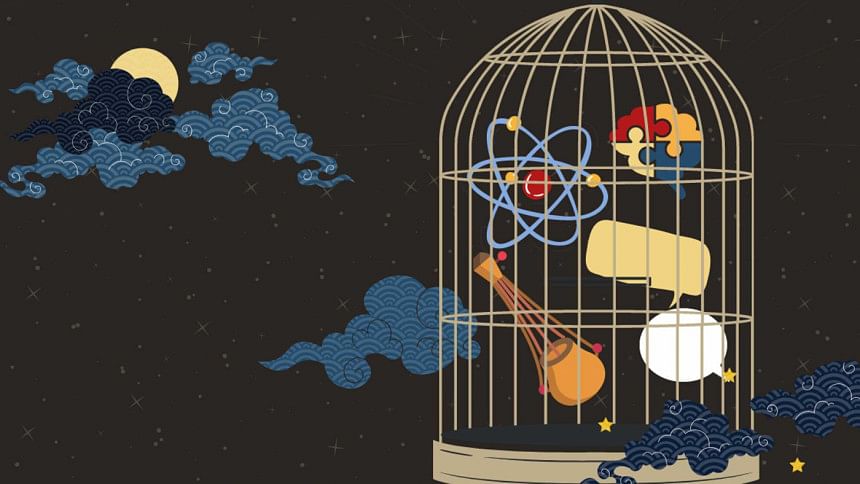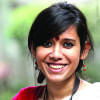When sentiments reign over reason

Some of us may breathe a sigh of relief that Hriday Mondal, imprisoned for 19 days and denied bail twice, for trying to explain the difference between science and religion to his students, has been granted bail. After all, many accused and arrested for similar acts did not fare so well: Pabitra Kumar Roy, a headmaster at Lalmonirhat's Taluk Shakhati High School, had to spend 100 days in jail for writing a post commenting on the need for "sacrificing the inner beasts" during Eid-ul-Azha, before finally being granted bail. Jhuman Das, arrested under the Digital Security Act (DSA) for criticising Hefazat-e-Islam leader Mamunul Haque, was denied bail for six months, while Ruma Sarkar, assistant professor at Begum Badrunnessa Government Girls' College, was in jail for 61 days for citing false information (which she believed to be true at the time) while protesting the Durga Puja attacks last year during a Facebook live.
By now, Mondal's case may have ceased to be the trending topic of protest, but one would do well to remember that neither his fight, nor ours, is over.
Mondal and his family say that people have been continuously harassing them, kicking their door and verbally abusing them. During an interview with The Daily Star, Mondal described the events that led to his arrest: just as the school authorities handed him a letter of temporary suspension, angry mobs descended upon his house, threatening to attack with sticks and brickbats. The police and the DC rescued him from the volatile situation and advised him, apparently, that going to jail would be the "safest" course of action.
Unfortunately, police "advising" members of minority communities being threatened by angry majoritarian mobs to choose "police custody" seems to have become somewhat of an unofficial policy in dealing with overblown cases of mass outrage. Instead of trying to assuage the public—who are easily provoked by false or misleading information—or arresting those who actually desecrate minority homes and places of worship in the name of religion for their own political and economic gains, the administration and law enforcement have somehow taken it upon themselves to turn prisons into "shelter homes" for those exercising their constitutional right of freedom of expression—who often come from non-Muslim backgrounds.
Now, of course, freedoms of speech and expression are not absolutes; in any given society, there are some limits to these fundamental rights, such as laws protecting marginalised and minority communities from hate speech and discrimination. In our country, however, the laws seem to have less to do with protecting the rights of the marginalised and more to do with pandering to the hypersensitivity of the majority.
Although Bangladesh does not have blasphemy laws as such, it retains two sections (295A and 298) from the outdated, colonial-era Penal Code, which state that if any person who has a "deliberate" or "malicious" intention of "outraging the religious feelings," and insults or attempts to insult the religion or religious belief of another, is liable to imprisonment for up to two years, or fines, or both. Attempts by the Jamaat-e-Islami on different occasions to formulate a blasphemy law—and demands by various Islamist groups over the decades—authorising the death penalty have not been successful in instituting the kind of blasphemy laws and practices we see in countries like Pakistan. But that's hardly a cause for celebration, given that the current regime has essentially created the scope for criminalising any discussion on religion that veers from the dominant Salafi-Wahhabi strain of Islam—which has found a footing in Bangladesh in recent decades—through the enactment and widespread application of Section 57 of the ICT Act and, more recently, the DSA.
The DSA criminalises "causing hurt to religious beliefs" and "provoking unrest," yet there are no definitions of what those actually mean. The terminology itself is so vague and subjective that it begs for misinterpretation and misapplication. How does one set the parameters of someone else's "hurt feeling"? We honestly don't know yet, because as of now, none of the cases filed under the DSA has been disposed of, and there's been no ruling of what can reasonably "hurt" a "religious sentiment." And yet, many have already spent months in jail and paid high prices for these imagined offences—people like 10th-grader Dipti Rani Das, who was jailed for a year and denied bail six times before finally being released on bail at the intervention of the High Court.
According to the Centre for Governance Studies, which has documented over 2,000 DSA cases filed against 1,530 people in 2020-21, at least 90 people were prosecuted for allegedly hurting "religious" sentiment online and provoking unrest. Of them, at least 55 were from the Hindu community. The cases reveal a disturbing trend of heightened sensitivity on any discussion related to religion and growing intolerance to ideas or viewpoints that are different to those held by the majoritarian populace. Take the four separate cases under the Penal Code and the DSA against Baul singer Rita Dewan for performing a "Pala Gaan" with fellow artiste Shah Alam Sarkar, for example. Pala Gaan traditionally consists of metaphysical discourses, shlok and songs, which are presented to the audience in the form of a dialogue—meant to provoke, not insult audiences. In this case, the topic being debated was "Living Beings versus the Greatest," but the nuance of the argument as well as the long tradition of debate simply went over the heads of the audience.
Surely, disagreement or debate on any topic—more so on faith, which necessitates examining in order to truly understand the complex realities of the universe—cannot be discouraged, much less criminalised, in a society that purports to value truth and critical thinking. But here lies the catch: we are not a society that values critical thinking. We do not encourage differences of opinion, or nuanced debates on history or politics—not in parliament, on the streets, our columns or the classrooms. We do not even allow a citizen to formulate a critical post about a minister's failures, so why should we expect anything different from the masses who have their own political biases and preferences, fuelled by socio-political realities not entirely of their own making?
Over the years, we have seen this intolerance take on more aggressive hues. Even the smallest nudges can throw us into the throes of "hurt" and fits of brutality. We can burn down homes of entire communities in the so-called defence of our belief, all the while oblivious to the fact that it is us, in fact, who are doing a disservice to its teachings. As someone born into a Muslim family, my religious sentiments are hurt every time I see such untoward aggression and violence in the name of religion, or every time I hear preaching which spews hatred against minorities and women in sharp contradiction to what I believe the religion teaches us: tolerance and respect for all. If we are to truly serve religion, we must save it from the intolerant, bigoted versions we have allowed ourselves to become.
Sushmita S Preetha is the head of the Editorial Department at The Daily Star.

 For all latest news, follow The Daily Star's Google News channel.
For all latest news, follow The Daily Star's Google News channel. 








Comments